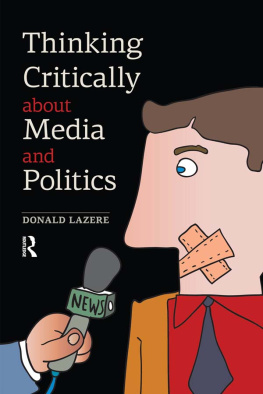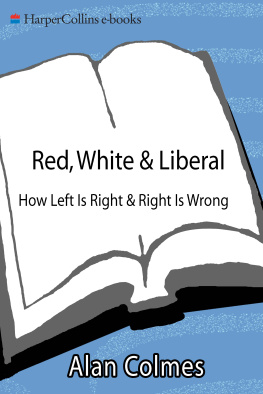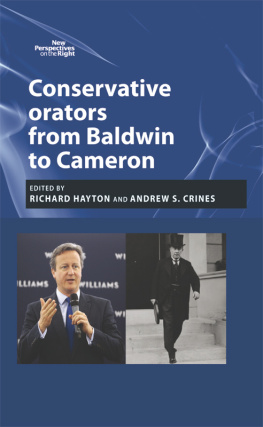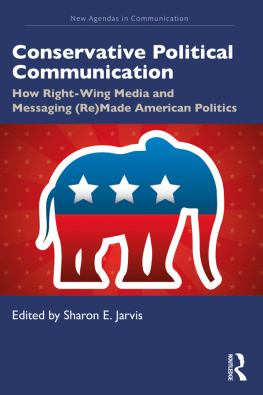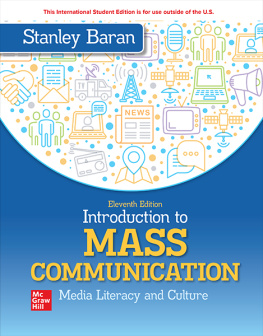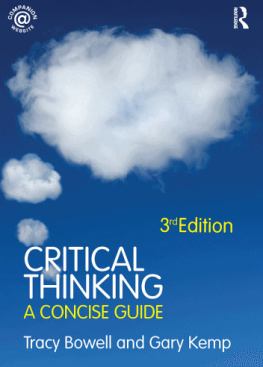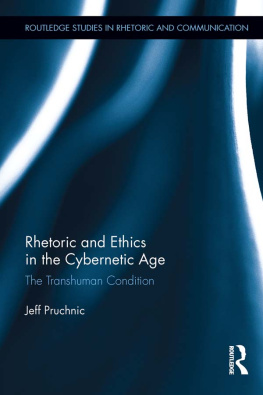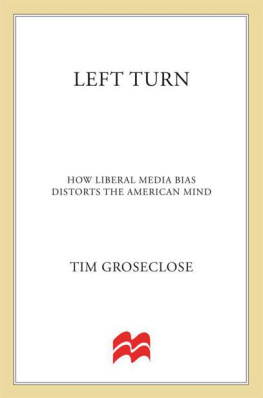First published 2013 by Paradigm Publishers
Published 2016 by Routledge
2 Park Square, Milton Park, Abingdon, Oxon OX14 4RN
711 Third Avenue, New York, NY 10017, USA
Routledge is an imprint of the Taylor & Francis Group, an informa business
Copyright 2013, Taylor & Francis.
All rights reserved. No part of this book may be reprinted or reproduced or utilised in any form or by any electronic, mechanical, or other means, now known or hereafter invented, including photocopying and recording, or in any information storage or retrieval system, without permission in writing from the publishers.
Notice:
Product or corporate names may be trademarks or registered trademarks, and are used only for identification and explanation without intent to infringe.
Library of Congress Cataloging-in-Publication Data
Lazere, Donald.
Thinking critically about media and politics / Donald Lazere.
pages cm
Includes bibliographical references and index.
ISBN 978-1-61205-273-1 (hardcover: alk. paper)
1. Mass mediaPolitical aspectsUnited States. 2. Press and politicsUnited States. 3. Critical thinkingUnited States. I. Title.
P95.82.U6L39 2013
302.230973dc23
2012046075
ISBN 13: 978-1-61205-273-1 (hbk)
ISBN 13: 978-1-61205-274-8 (pbk)
__________
Our culture places huge value on physical fitness. The media are filled every day with ads for building muscles or working off fat, and with dramatic images of self-defense. There are not many ads for, or dramatizations of, building our mental muscles, reducing the fat in our brain, or defending ourselves in argumentation. Shouldnt we be able to fight back against those trying to take verbal and intellectual advantage of us? This book is a survival guide for self-defense against manipulation by political, commercial, and other varieties of propaganda, as communicated through mass media.
The book is a spin-off of Reading and Writing for Civic Literacy: The Critical Citizens Guide to Argumentative Rhetoric, a textbook primarily for the second term of first-year English classes or a more advanced course in argumentative writing. This version places less emphasis on the writing dimension and formal exposition of rhetorical terminology, in the hope that it will be useful in a wider range of college courses, including the social sciences, journalism, communications, and media criticismin which it could be read either as a central text or as a supplement to more discipline-specific books. Exercises at the end of sections stimulate thought, discussion, research, and writing assignments. Because much of the analysis of political arguments throughout the book emphasizes common fallacies in reasoning, the Appendix contains a glossary of logical fallacies, and the terms in that list are boldfaced throughout the text.
In recent years, best-seller lists have been filled with liberal and conservative polemics like Ann Coulters Slander: Liberal Lies about the American Right and Al Frankens Lies and the Lying Liars Who Tell Them: A Fair and Balanced Look at the Right. This phenomenon recalls George Orwells judgment in Politics and the English Language: In our age, there is no such thing as keeping out of politics. All issues are political issues, and politics itself is a mass of lies, evasions, folly, hatred and schizophrenia (Orwells Nineteen Eighty-Four, 256). Especially with the proliferation in the past few decades of partisan media of news and commentary on TV, radio, and the Internet, many Americans have been able to expose themselves only to sources of information that they already agree with and to shut out any contradictory viewpoints. (Even the most highly educated, scrupulous thinkers are innately captive to egocentric and ethnocentric biases on public controversies, needing to struggle constantly against those biases.) Those on the right and left shrilly accuse the other side of diabolically deceptive, monopolistic control of American politics, media, culture, and education, while portraying their own side as powerless, persecuted, and wholly virtuous. All sides claim to have irrefutable evidence proving they are telling the truth and their opponents are lying. So what are we to make of this dizzying, vicious circle of accusation? How can we possibly distinguish truth-tellers from liars?
This book aims to approach these questions through the application of principles of critical thinking and argumentative rhetoricdefined as the study of elements and patterns of persuasion, both scrupulous and unscrupulous ones (though popular usage tends to equate rhetoric solely with the latter). This approach to critical thinking and rhetoric also draws heavily from the study of semanticsemphasizing the role in argumentation of definition or denotation of terms, verbal slanting, and emotional appeal through connotative language, what I term cleans and dirties. For example, compare the different connotative spins in two responses to a 2007 U.S. Treasury Department report on trends in income mobility in America during the previous decade. An editorial in the conservative Wall Street Journal said, Of those in the second lowest income quintile, nearly 50% moved into the middle quintile or higher. This is a stunning show of upward mobility, meaning that more than half of all lower-income Americans in 1996 had moved up the income scale in only 10 years. But liberal columnist Eugene Robinson in the Washington Post, looking at the same figures, wrote, An incredible 42 percent of children born into that lowest quintile are still stuck at the bottom, having been unable to climb a single rung of the income ladder.
Semantic misunderstandings constantly result from liberals and conservatives different subjective viewpoints on, definitions of, and connotative spins on, the very words liberal and conservative, as well as related words like capitalism, socialism, and democracy. President Obama was widely identified by conservatives in polls as a socialist, communist, or Marxist, although such polls rarely asked the respondents how they defined those terms or what evidence justified them. At the same time, many liberals were denouncing Obama for selling out to Wall Street capitalists and for continuing the same conservative policies as President Bush on the wars in Afghanistan and Iraq, national security, and domestic surveillance. approaches such semantic misunderstandings by presenting a glossary of political terms like these in all their complexities, ambiguities, and points of disagreement; the aim is to arrive at definitions that are agreed on by both liberals and conservatives, or leftists and rightists, so that they can at least agree about what they disagree about. Semantic study also emphasizes the open-ended nature of controversies between, say, conservatives and liberals. The journal of the Institute for General Semantics is titled et cetera, reflecting the principle that there is rarely any last word in such controversies but only a continuous sequence of rebuttals and counter-rebuttals. So at several points in the book students are asked explicitly or implicitly to try to find arguments that refute the arguments presented here.

